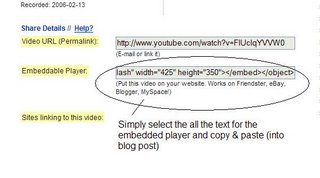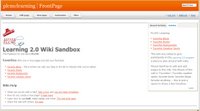Listen to this podcast [2:17]-->
powered by ODEOThe word
podcast is used to refer to a non-musical audio or video broadcast that is distributed over the Internet. What differentiates a podcast from regular streaming audio or video is that the delivery method for podcasts is often done automatically through RSS.
In 2005, "podcast" was named the "
word of the year" by New Oxford American Dictionary and with the growth of podcasting over the last three years, it's easy to see why.
Podcasts take many forms, from short 1-10 minutes commentaries (like the ones used in this Learning 2.0 program) to much longer personal interviews or panel group discussions.
There’s a podcast out there for just about every interest area and the best part about this technology is that you don’t have to have an iPod or a MP3 player to access them.
Since podcasts use the MP3 file format, a popular compressed format for audio files, you really just need a PC (or portal device) with headphones or a speaker.
iTunes, the free downloadable application created by Apple is the directory finding service most associated with podcasts, but if you don’t have iTunes installed there are still plenty of options.
For this discovery exercise participants are asked to take a look at some popular podcast directory tools.
Do some exploring on your own and locate a podcast that is of interest to you.
Once found, you can easily pull the RSS feed into your Bloglines account as well, so that when new casts become available you’ll be automatically notified of their existence.
Discovery Resources:
There are many, many podcast directories and finding tools out there. Here are just three of the more popular ones that, unlike iTunes, don't require a software download:
Discovery Exercise:
- Take a look at one or two of the podcast directories listed and see if you can find a podcast that interests you. See if you can find some interesting library related podcasts here like book review podcasts or library news.
- Add the RSS feed for a podcast to your Bloglines account
- Create a blog post about your discovery process. Did you find anything useful here?
Can you see a use for podcasts in the library situation?
OPTIONAL:
You may try to create your own podcast using free downloadable programs such as Audacity. More and more often podcasts are being used as instructional aids (like the ones used in this program). So, for anyone interested in creating new on-line services for your library you may like to explore making your own podcast. I recently played with Audacity and found it relatively straightforward, so why not give it a go!
You may also like to listen to the following podcast by Helene Blowers (creator of this Learning 2.0 program) Learning 2.0 : Make "play" your New Year's resolution
She discusses the development of this program and the concept of lifelong learning.


































